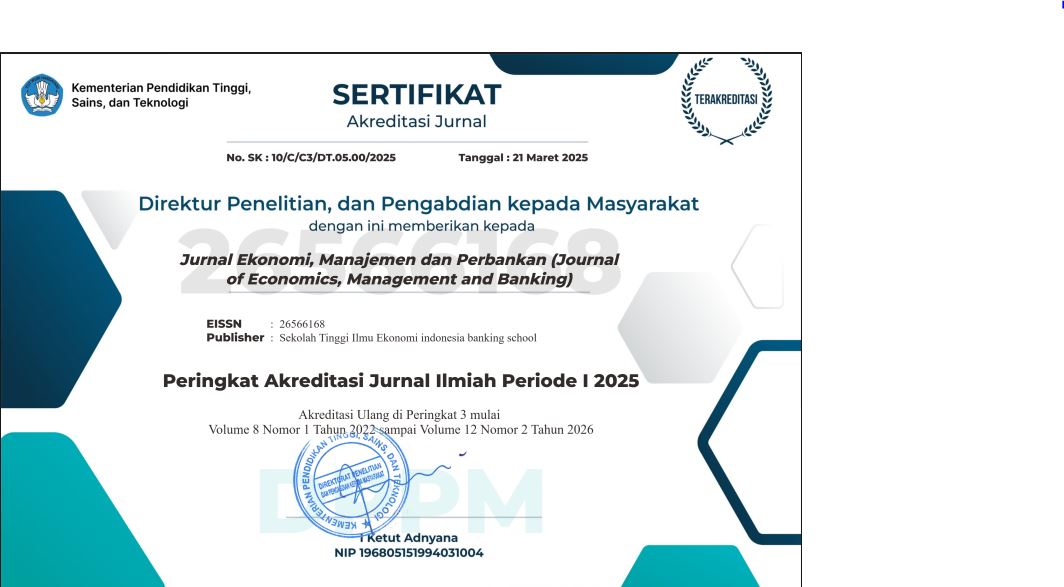Analisis Faktor yang Mempengaruhi Fleksibilitas Sumber Daya Manusia Pada Perus-ahaan Startup di Masa Pandemi Covid-19
DOI:
https://doi.org/10.35384/jemp.v7i2.253Keywords:
Adaptabilitas budaya, Covid-19, Flexibilitas Sumber Daya Manusia, Inovasi, Motivasi, StartupAbstract
Tujuan dari penelitian ini adalah untuk mengetahui bagaimana adaptabilitas budaya, inovasi organisasi dan motivasi kerja mempengaruhi flexibilitas sumber daya manusia di masa pandemi Covid-19 perus-ahaan startups di indonesia. Peneltian ini menggunakan metode kuantitatif dan pengumpulan data dengan menggunakan kuisioner yang disebarkan kepada pekerja di perusahaan startup di Indonesia. Dalam penelitian ini populasi adalah karyawan perusahaan Startups sebanyak 100 orang karyawan. Data dalam penelitian ini menggunakan data primer. Hasil penelitian ini menunjukkan bahwa adaptabilitas budaya, inovasi oerganisasi dan motivasi kerja berpengaruh signifikan positif tehadap flexibilitas sumber daya manusia di perusahaan - perusahaan startups di Indonesia.References
Agarwal, V., Eloot, K., dan Patel, A. (2019) Mov-ing past the ‘pilot trap’ to unleash Industry 4.0 in Indonesia, McKinsey & Company.
Casper, W. J., & Harris, C. M. (2008). Work-life benefits and organizational attachment: Self-interest utility and signaling theory models. Journal of Vocational Behavior, 72(1), 95-109.
Chukwuma, E.M., & Obiefuna, O. (2014). Effect of Motivation on Employee Productivity: A Study of Manufacturing Companies in Nnewi. Journal of Managerial Studies and Research 2 (7).
Creswell, J. W. (2016). Reflections on the MMIRA the future of mixed methods task force report.
Deloitte (2019) The Deloitte Global Millennial Sur-vey 2019 Societal discord and technological transformation create a “generation disrupt-edâ€.
Ghozali, I. (2016) Aplikasi Analisis Multivariete Dengan Program (IBM SPSS). Edisi 8. Ba-dan Penerbit Universitas Diponegoro. Sema-rang.
Maitri, L., dan Purba, D. E. (2018). Hubungan an-tara Fleksibilitas Sumber Daya, Modal Psikologis dan Perilaku Kerja Inovatif. Jurnal Psikologi, 14(1), 86-94.
Moleong, J.L. (2014). Metodologi Penelitian Kuali-tatif. Bandung, Indonesia: Remaja Rosda Karya.
Ngo, H. Y., dan Loi, R. (2008). Human resource flexibility, organizational culture and firm performance: An investigation of multina-tional firms in Hong Kong. The International Journal of Human Resource Management, 19(9), pp. 1654-1666.
Pamela, A.O., & Oloko (2015). Effect of motiva-tion on employee performance of commercial banks in kenya : A case study of Kenya Com-mercial Bank in Migori County. Journal of Human Resource Studies 5 (2).
Prajogo, D. I., & McDermott, C. M. (2011). The relationship between multidimensional organ-izational culture and perfor-mance. International Journal of Operations & Production Management.
Oktaviani, D. N., Firdaus, M. A., & Bimo, W. A. (2020). Kualitas Suber Daya Manusia dan Motivasi Terhadap Kinerja Karyawan. Man-ager: Jurnal Ilmu Manajemen, 3(1), 101-113.
Shagvaliyeva, S., and Yazdanifard, R. (2014). Im-pact of flexible working hours on work-life balance. American Journal of Industrial and Business Management, 2014.
Simanjuntak, D., & Fitriana, R. (2020). Culture Shock, Adaptation, and Self-Concept of Tourism Human Resources in Welcoming the New Normal Era. Society, 8(2), pp. 403-418.
Sekaran, Uma dan Roger Bougie. (2017), Metode Penelitian Bisnis, Edisi 6, Jakarta: Penerbit Salemba Empat.
Sugiyono (2017). Metode Penelitian Kuantitatif Kualitatif dan R&D. Bandung : Alfabeta.
Uzkurt, C., Kumar, R., Kimzan, H. S., dan Emi-noǧlu, G. (2013). Role of innovation in the relationship between organizational culture and firm performance: A study of the bank-ing sector in Turkey. European Journal of Innovation Management, 16(1), pp. 92-117.
Downloads
Published
Issue
Section
License
Authors who publish with this journal agree to the following terms:
- Authors retain copyright and grant the journal right of first publication with the work simultaneously licensed under a Creative Commons Attribution License that allows others to share the work to acknowledge the work's authorship and initial publication in this journal.
- Authors can enter into separate, additional contractual arrangements for the non-exclusive distribution of the journal's published version of the work (e.g., post it to an institutional repository or publish it in a book) with an acknowledgment of its initial publication in this journal.
- Authors are permitted and encouraged to post their work online (e.g., in institutional repositories or on their website) before and during submission. It can lead to productive exchanges and earlier and greater citation of published work.















